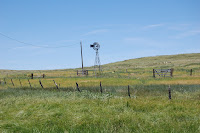 Is there anything more intimidating to a fiction writer than a blank piece of paper or a blank screen? What do you do with it?
Is there anything more intimidating to a fiction writer than a blank piece of paper or a blank screen? What do you do with it?This past weekend I was lucky enough to present my ideas for my plotting methods to my Sisters in Crime - Colorado group. This is a wonderful organization and our Colorado chapter has a great group of writers. The sessions are always good for generating ideas and for tossing out new ideas when someone is having trouble with their current work in progress.
As I planned my portion of my plotting session I got to thinking about not only my particular haphazard method of plotting but how much I have learned about the overall plotting process through the years. When I first started writing I began by simply sitting down with a blank notebook, a pencil and a vague idea in my mind. I had one character and I had no idea what she was going to do. My first story ever was about a teenager who got kidnapped with a rock star. I think I had Herman from Herman's Hermits in mind when I wrote it. But I started out by writing a scene. Strangely enough I still write that way. When I get bogged down is when I start planning so many scenes in advance and then my mind doesn't seem to want to write them. That made me start thinking about the entire plotting process. And what I came up with was DO IT YOUR WAY. Only you can tell what process works for you. Here are some ideas for figuring that out.
1. Try plotting a story if you must. List the scenes that you know you need and then start writing them. As one of our presenters mentioned, even if you are listing them as you go along or a scene or two in advance, then you are plotting through the outline method. There's no problem with that and by writing them down as you go you are also able to see where certain events go in case you need to refer back to something.
2. Plot using the "What if" method. That is one of the things that always gets me going on a story even if I have no idea about the direction it is headed. By writing down the "What if" I can find motivation coming alive for my characters. Well, if X happens, how will my main character react? How about those around him or her? What will happen as a result of that.
3. Try plotting a few scenes ahead of time. Usually this can work for me because then I know what scenes are coming up. I can plant clues or misdirect the hero or heroine in the current chapter or scene and know what I need to do as I work toward the overall outcome.
4. Try plotting by chapters. Usually there may be two to three scenes in a chapter so in that case I might use a story board to make sure I am keeping my pacing going in each chapter. No one wants scene after scene of back story. The reader gets bored. Also no one wants scene after scene of chases or life and death situations. The reader gets breathless. Plotting by chapter lets you see where you need to let up on the action or make something happen.
5. Try simply writing out the story itself from beginning to finish -- no dialogue, no description. That in itself can become your overall outline. This can sometimes serve as a backbone to your book too. You can always take some of the parts and then embellish them should you get bogged down at any point in the book.
Most of all, though, experiment and figure out what works best for you in plotting. There is nothing worse that getting bogged down using a certain method and getting so wrapped up in the method that you forget to write the story. I regularly teach classes on a method called the Plotting Circle, and that was the session I presented on Saturday. It works well for anyone who needs to outline or if you are like me and plot organically or a scene at a time. Email me at writethatnovel@gmail.com if you would like to learn more about how to use the Plotting Circle.











